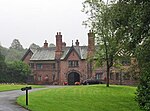Swinton is a town in the City of Salford in Greater Manchester, England. southwest of the River Irwell, 4 miles (6.4 km) northwest of Manchester, adjoining the town of Pendlebury and suburb of Clifton. In 2014, it had a population of 22,931.Historically in Lancashire, for centuries Swinton was a hamlet in the township of Worsley, parish of Eccles and hundred of Salfordshire. The name Swinton is derived from the Old English "Swynton" meaning "swine town". In the High Middle Ages, Swinton was held by the religious orders of the Knights Hospitaller and Whalley Abbey. Farming was the main occupation, with locals supplementing their incomes by hand-loom woollen weaving in the domestic system.Collieries opened during the Industrial Revolution and Swinton became an important industrial area with coal providing the fuel for the cotton spinning and brickmaking industries. Bricks from Swinton were used for industrial projects including the Bridgewater Canal, which passes Swinton to the south. The adoption of the factory system facilitated a process of unplanned urbanisation in the area, and by the mid-19th century Swinton was an important mill town and coal mining district at a convergence of factories, brickworks and a newly constructed road and railway network.Following the Local Government Act 1894, Swinton was united with neighbouring Pendlebury to become an urban district of Lancashire. Swinton and Pendlebury received a charter of incorporation in 1934, giving it honorific borough status. In the same year, the United Kingdom's first purpose-built intercity highway—the major A580 road (East Lancashire Road), which terminates at Swinton and Pendlebury's southern boundary—was officially opened by King George V. Swinton and Pendlebury became part of the City of Salford in 1974. Swinton is the seat of Salford City Council and a commuter town, supported by its transport network and proximity to Manchester city centre.








